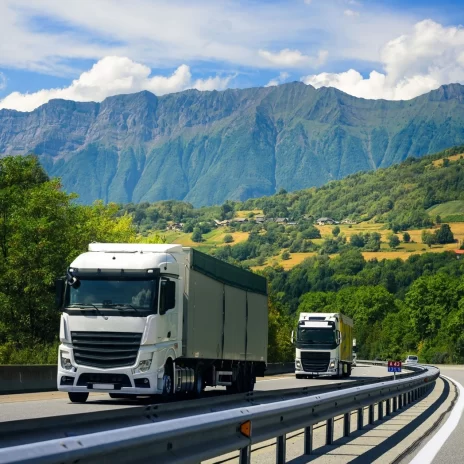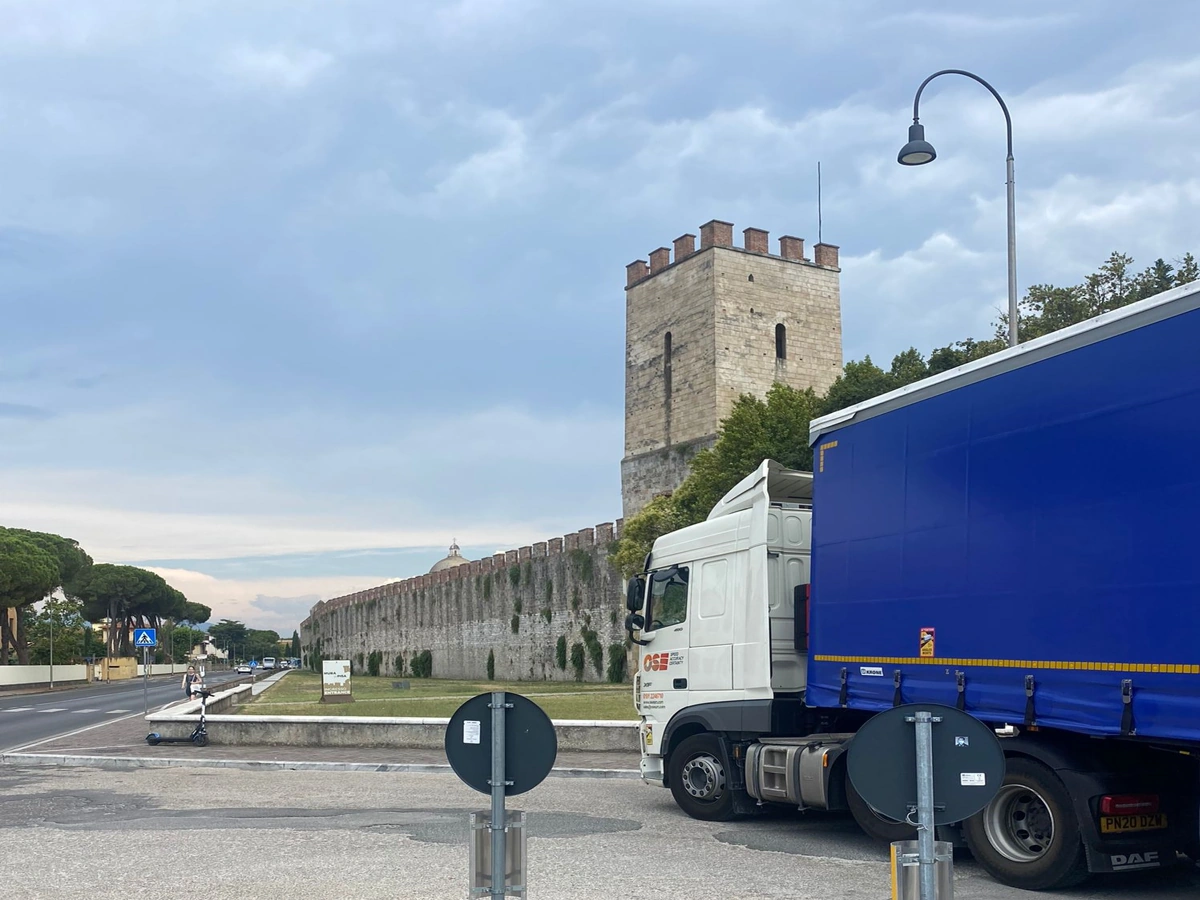
A complete guide to European road freight
Navigating European road freight can be complex but essential for businesses that require reliable, cost-effective and efficient cross-border logistics.
With a diverse landscape of countries, each with its own regulations and transportation infrastructure, coordinating consignment movement across the continent requires strategic planning and the right expertise.
In this blog post, we will discuss European road freight, including the various types of services, customs regulations, and key factors to consider when choosing a logistics provider.
What is European road freight?
European road freight is the transportation of goods across Europe by road, using vans and lorries. It is an important component of the continent’s logistics and supply chain network, allowing businesses to move goods between cities, countries, and across borders.
There are several types of road freight services available across Europe, including:
- Full Truckload (FTL): This is where a single shipment fills the entire truck. It is ideal for large shipments or when companies require direct transportation with no stops.
- Less-than-Truckload (LTL) (Groupage): Smaller shipments from multiple customers are combined into a single lorry, allowing businesses to save money on small loads.
- Express and time-critical services: Used for urgent deliveries requiring a guaranteed delivery time, often at a higher cost.
- Temperature-controlled freight: Necessary for transporting perishables like food, pharmaceuticals, or chemicals that require specific climate conditions.
This type of transportation has become essential in industries such as retail, manufacturing, and e-commerce.
Within the EU, simplified customs procedures allow goods to travel more freely, reducing delays and paperwork. However, shipments to non-EU countries must adhere to specific customs processes and provide accurate documentation to clear borders.
Logistics providers are often essential in managing these requirements, handling customs declarations and ensuring compliance to maintain smooth transit across varying regulatory borders.
Customs regulations and border procedures
Customs regulations and border procedures for European road freight vary depending on whether the goods are transported within the EU, between EU and non-EU countries, or specifically to and from the UK.
Here is an overview of the key processes:
Intra-EU road freight (EU to EU)
- Simplified customs: Within the EU’s Single Market, goods generally move freely between member states, with no customs checks or tariffs. This free movement results in less paperwork, making cross-border road freight quick and seamless.
- VAT Compliance: Businesses shipping within the EU must still adhere to VAT regulations, recording transactions to ensure compliance with local tax laws.
- EU Customs Codes: Goods must comply with EU standards and regulations, including product safety and quality control.
EU to non-EU countries in mainland Europe (e.g., Norway, Switzerland)
- Customs declarations: Goods transported from the EU to non-EU countries in mainland Europe must include a customs declaration that describes the shipment’s contents, value, and origin.
- Export documentation: Exports are managed using the EU’s Export Control System (ECS). Businesses must fill out the Single Administrative Document (SAD) as their primary export form, or use electronic customs forms through the Automated Export System (AES).
- Duties and VAT: Depending on the country’s regulations, goods entering the non-EU country may be subject to duties and VAT.
- Border control: Border checks are performed to confirm customs declarations and collect any applicable taxes.
UK to EU and EU to UK (Post-Brexit)
The UK’s exit from the European Union put an end to the free movement of goods across UK-EU borders, replacing it with new customs procedures, documentation requirements, and trade regulations, including:
- Customs declarations: Goods moving between the UK and EU require both an export declaration from the departing country and an import declaration upon arrival. Traders must submit information through systems such as the UK’s Customs Declaration Service (CDS) or the EU’s New Computerised Transit System (NCTS).
- EORI number requirement: Businesses must have an Economic Operators Registration and Identification (EORI) number to trade across UK-EU borders.
- Rules of origin: To qualify for zero tariffs under the UK-EU Trade and Cooperation Agreement, goods must meet specific rules of origin to prove the goods originate in the UK or EU.
- VAT and Duties: Goods are subject to VAT and, in some cases, customs duties. Import VAT is typically payable at the border, although businesses can use VAT deferral schemes in both the UK and EU.
- Border checks: Customs, sanitary, and phytosanitary (SPS) inspections are conducted on certain goods such as food and plants. The UK operates controls at ports such as Dover, whereas the EU conducts checks in the countries where goods first arrive.

Key factors to consider when choosing the right logistics provider
When selecting a logistics provider for European road freight, several key factors can make a substantial difference in ensuring efficient, reliable, and cost-effective transport. These include:
Geographic coverage and network
It’s important to confirm that a logistics provider operates routes in the necessary regions, whether within the EU, between EU and non-EU countries, or to and from the UK. Providers with well-established networks across Europe are typically better equipped to manage cross-border requirements.
Additionally, carriers with local expertise can better navigate regional regulations, customs requirements, and specific delivery challenges.
Customs and regulatory compliance
Since Brexit, customs procedures have become more complex and vary significantly by country, making it critical to choose a logistics provider experienced in customs declarations, VAT, and import/export paperwork, especially when transporting to and from non-EU countries.
In addition, ensure that the provider has all necessary licenses and certifications, such as an EORI number, as well as any sector-specific certifications required for compliance, such as those for transporting hazardous goods.
Service flexibility and capacity
Logistics providers should provide a variety of freight service options, such as Full Truckload (FTL), Less-than-Truckload (LTL), and express services, allowing businesses to choose the most cost-effective and time-efficient option for their needs.
It’s also important to verify the provider’s capacity, especially during peak seasons, to ensure they can accommodate your freight volumes. A reliable carrier will have the resources to manage your shipments without delays, regardless of seasonal demands.
Technology and Tracking
Real-time tracking and digital documentation systems are required for effective shipping. A carrier that includes GPS tracking and digital updates provides valuable shipment visibility, allowing you to track delivery progress, predict arrival times, and address potential delays quickly.
How OSE European can help
At OSE European, we specialise in Express European road freight, offering full and part-load trailers with multiple collection points.
With warehouses in Gateshead, Diksmuide (Belgium), and Calais (France), we provide secure logistics solutions across Europe.
We can deliver to mainland Europe from the UK in as little as 12 hours, and with satellite tracking, we monitor your shipment to avoid delays.
With over a decade of experience, we understand the challenges of cross-border transport. Whether your consignment is large or small, our expert team can ensure its swift, secure delivery.
Contact us today to find out more.
